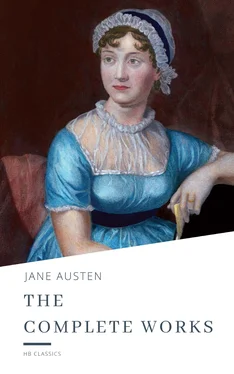"Perhaps, then," he hesitatingly replied, "what I heard this morning may be—there may be more truth in it than I could believe possible at first."
"What did you hear?"
"That a gentleman, whom I had reason to think—in short, that a man, whom I KNEW to be engaged—but how shall I tell you? If you know it already, as surely you must, I may be spared."
"You mean," answered Elinor, with forced calmness, "Mr. Willoughby's marriage with Miss Grey. Yes, we DO know it all. This seems to have been a day of general elucidation, for this very morning first unfolded it to us. Mr. Willoughby is unfathomable! Where did you hear it?"
"In a stationer's shop in Pall Mall, where I had business. Two ladies were waiting for their carriage, and one of them was giving the other an account of the intended match, in a voice so little attempting concealment, that it was impossible for me not to hear all. The name of Willoughby, John Willoughby, frequently repeated, first caught my attention; and what followed was a positive assertion that every thing was now finally settled respecting his marriage with Miss Grey—it was no longer to be a secret—it would take place even within a few weeks, with many particulars of preparations and other matters. One thing, especially, I remember, because it served to identify the man still more:—as soon as the ceremony was over, they were to go to Combe Magna, his seat in Somersetshire. My astonishment!—but it would be impossible to describe what I felt. The communicative lady I learnt, on inquiry, for I stayed in the shop till they were gone, was a Mrs. Ellison, and that, as I have been since informed, is the name of Miss Grey's guardian."
"It is. But have you likewise heard that Miss Grey has fifty thousand pounds? In that, if in any thing, we may find an explanation."
"It may be so; but Willoughby is capable—at least I think"—he stopped a moment; then added in a voice which seemed to distrust itself, "And your sister— how did she—"
"Her sufferings have been very severe. I have only to hope that they may be proportionately short. It has been, it is a most cruel affliction. Till yesterday, I believe, she never doubted his regard; and even now, perhaps—but I am almost convinced that he never was really attached to her. He has been very deceitful! and, in some points, there seems a hardness of heart about him."
"Ah!" said Colonel Brandon, "there is, indeed! But your sister does not—I think you said so—she does not consider quite as you do?"
"You know her disposition, and may believe how eagerly she would still justify him if she could."
He made no answer; and soon afterwards, by the removal of the tea-things, and the arrangement of the card parties, the subject was necessarily dropped. Mrs. Jennings, who had watched them with pleasure while they were talking, and who expected to see the effect of Miss Dashwood's communication, in such an instantaneous gaiety on Colonel Brandon's side, as might have become a man in the bloom of youth, of hope and happiness, saw him, with amazement, remain the whole evening more serious and thoughtful than usual.
From a night of more sleep than she had expected, Marianne awoke the next morning to the same consciousness of misery in which she had closed her eyes.
Elinor encouraged her as much as possible to talk of what she felt; and before breakfast was ready, they had gone through the subject again and again; and with the same steady conviction and affectionate counsel on Elinor's side, the same impetuous feelings and varying opinions on Marianne's, as before. Sometimes she could believe Willoughby to be as unfortunate and as innocent as herself, and at others, lost every consolation in the impossibility of acquitting him. At one moment she was absolutely indifferent to the observation of all the world, at another she would seclude herself from it for ever, and at a third could resist it with energy. In one thing, however, she was uniform, when it came to the point, in avoiding, where it was possible, the presence of Mrs. Jennings, and in a determined silence when obliged to endure it. Her heart was hardened against the belief of Mrs. Jennings's entering into her sorrows with any compassion.
"No, no, no, it cannot be," she cried; "she cannot feel. Her kindness is not sympathy; her good-nature is not tenderness. All that she wants is gossip, and she only likes me now because I supply it."
Elinor had not needed this to be assured of the injustice to which her sister was often led in her opinion of others, by the irritable refinement of her own mind, and the too great importance placed by her on the delicacies of a strong sensibility, and the graces of a polished manner. Like half the rest of the world, if more than half there be that are clever and good, Marianne, with excellent abilities and an excellent disposition, was neither reasonable nor candid. She expected from other people the same opinions and feelings as her own, and she judged of their motives by the immediate effect of their actions on herself. Thus a circumstance occurred, while the sisters were together in their own room after breakfast, which sunk the heart of Mrs. Jennings still lower in her estimation; because, through her own weakness, it chanced to prove a source of fresh pain to herself, though Mrs. Jennings was governed in it by an impulse of the utmost goodwill.
With a letter in her outstretched hand, and countenance gaily smiling, from the persuasion of bringing comfort, she entered their room, saying,
"Now, my dear, I bring you something that I am sure will do you good."
Marianne heard enough. In one moment her imagination placed before her a letter from Willoughby, full of tenderness and contrition, explanatory of all that had passed, satisfactory, convincing; and instantly followed by Willoughby himself, rushing eagerly into the room to inforce, at her feet, by the eloquence of his eyes, the assurances of his letter. The work of one moment was destroyed by the next. The hand writing of her mother, never till then unwelcome, was before her; and, in the acuteness of the disappointment which followed such an ecstasy of more than hope, she felt as if, till that instant, she had never suffered.
The cruelty of Mrs. Jennings no language, within her reach in her moments of happiest eloquence, could have expressed; and now she could reproach her only by the tears which streamed from her eyes with passionate violence—a reproach, however, so entirely lost on its object, that after many expressions of pity, she withdrew, still referring her to the letter of comfort. But the letter, when she was calm enough to read it, brought little comfort. Willoughby filled every page. Her mother, still confident of their engagement, and relying as warmly as ever on his constancy, had only been roused by Elinor's application, to intreat from Marianne greater openness towards them both; and this, with such tenderness towards her, such affection for Willoughby, and such a conviction of their future happiness in each other, that she wept with agony through the whole of it.
All her impatience to be at home again now returned; her mother was dearer to her than ever; dearer through the very excess of her mistaken confidence in Willoughby, and she was wildly urgent to be gone. Elinor, unable herself to determine whether it were better for Marianne to be in London or at Barton, offered no counsel of her own except of patience till their mother's wishes could be known; and at length she obtained her sister's consent to wait for that knowledge.
Mrs. Jennings left them earlier than usual; for she could not be easy till the Middletons and Palmers were able to grieve as much as herself; and positively refusing Elinor's offered attendance, went out alone for the rest of the morning. Elinor, with a very heavy heart, aware of the pain she was going to communicate, and perceiving, by Marianne's letter, how ill she had succeeded in laying any foundation for it, then sat down to write her mother an account of what had passed, and entreat her directions for the future; while Marianne, who came into the drawing-room on Mrs. Jennings's going away, remained fixed at the table where Elinor wrote, watching the advancement of her pen, grieving over her for the hardship of such a task, and grieving still more fondly over its effect on her mother.
Читать дальше












